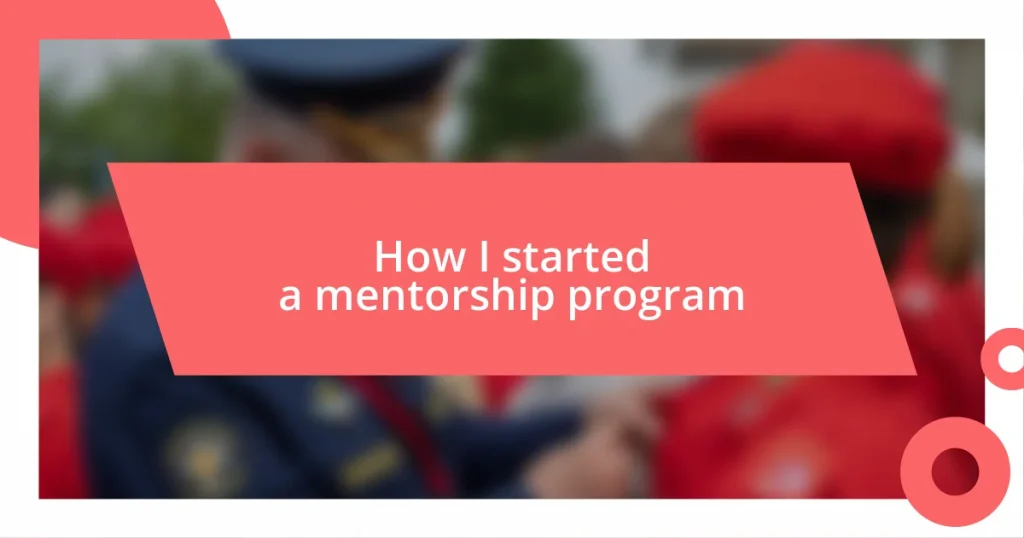Key takeaways:
- Mentorship is transformative, providing support, confidence, and valuable connections essential for career growth.
- Establishing a clear framework with defined objectives, structured meetings, and effective communication strategies is crucial for a successful mentorship program.
- Measuring success through both qualitative and quantitative feedback enhances understanding of the program’s effectiveness and fosters personal development among participants.
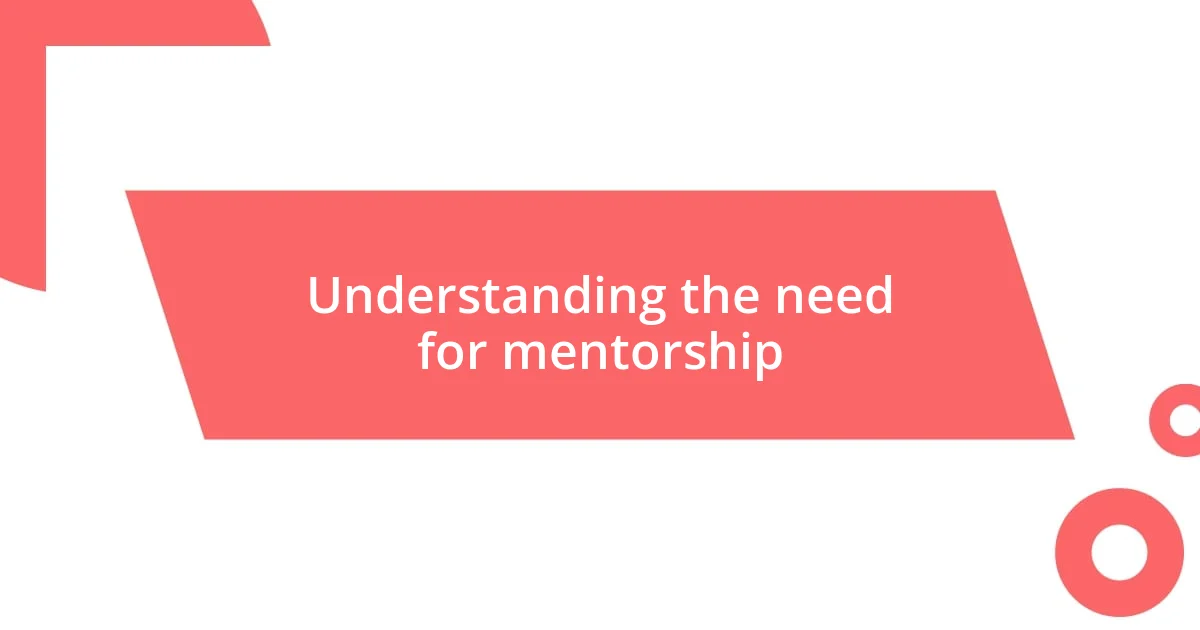
Understanding the need for mentorship
When I think about the value of mentorship, I’m reminded of my early career days, feeling uncertain and overwhelmed. I once sought advice from a seasoned professional who not only believed in my potential but also guided me through challenges I faced. This personal connection made me realize that mentorship isn’t just a transfer of knowledge; it’s about building confidence and fostering growth.
Have you ever felt lost in your career path, unsure of which direction to take? I certainly have. It was during one of those moments that a mentor shared their own missteps and triumphs, helping me see that learning from experiences—both the good and the bad—offers invaluable lessons. This taught me that mentorship provides support during critical phases in our careers, making the journey feel less solitary.
Moreover, I often wonder how many emerging professionals miss out on opportunities due to a lack of guidance. In my case, mentorship opened doors I didn’t even know existed. It created a ripple effect, connecting me with networks and resources that have shaped my trajectory. Understanding this need for mentorship becomes essential—it’s not just beneficial; it’s transformative, influencing both personal and professional development profoundly.
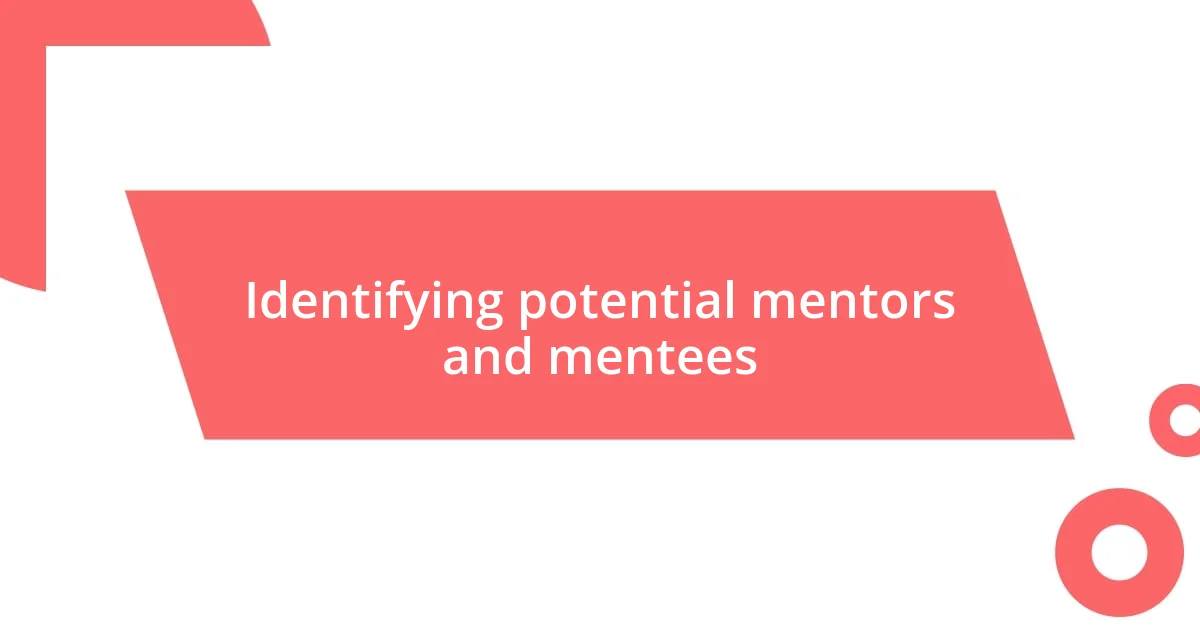
Identifying potential mentors and mentees
Identifying potential mentors and mentees requires a keen awareness of the qualities that make an effective pairing. In my experience, a good mentor embodies not just expertise, but also empathy and a genuine willingness to invest time in others. It’s like scouting for the right coach in any sports team; you want someone who understands the game and is passionate about nurturing talent.
When it comes to mentees, I often look for individuals who exhibit curiosity and eagerness to learn. I recall meeting a young professional at an industry conference. Her enthusiasm for asking questions and seeking insights struck me immediately. It reminded me of my own early days, where I would seize every chance to absorb knowledge from others. A mentor-mentee relationship flourishes when both parties are equally committed to growth.
To facilitate this process, I find it helpful to create a simple framework for identifying potential candidates. It’s not just about professional achievements; considering personality fits and shared values can lead to more fruitful interactions. Below is a comparison table I use to assess potential mentors and mentees effectively.
| Criteria | Mentor | Mentee |
|---|---|---|
| Experience Level | Expert or seasoned in a specific field | Early career or transitioning professional |
| Commitment | Dedication to developing others | Eager to learn and grow |
| Communication Skill | Ability to convey knowledge clearly | Willingness to ask questions |
| Shared Values | Alignment with the mentee’s goals | Appreciation for mentor’s expertise |
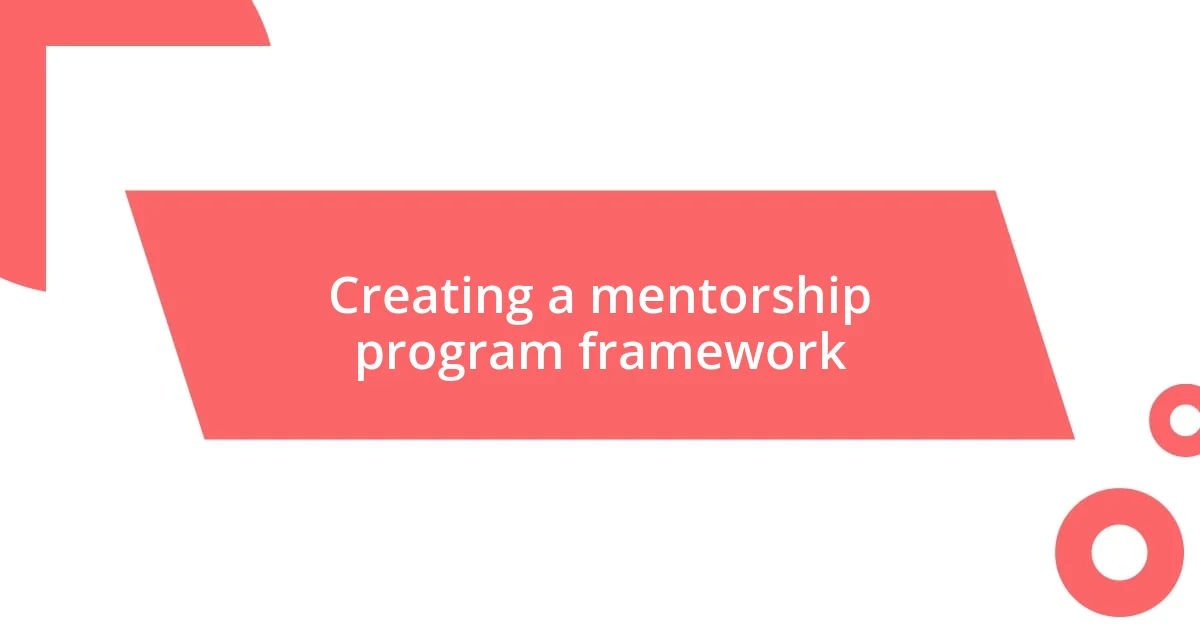
Creating a mentorship program framework
Creating a strong framework for a mentorship program is essential to ensure that both mentors and mentees can thrive. I remember when I first structured a program; I focused on aligning goals to create a shared vision. This clarity empowered both parties, which in turn fostered a productive partnership. Without a solid framework, the relationship can feel ambiguous and less fruitful.
To develop this framework, I recommend considering the following key elements:
- Clear Objectives: Define what you hope to achieve through mentorship—goal-setting is crucial.
- Structured Meetings: Set regular check-ins to maintain accountability and encourage progress.
- Skill Development Plans: Outline specific skills to be developed, tailoring them to the mentee’s aspirations.
- Feedback Mechanism: Incorporate a way for both parties to share constructive feedback and learn from each other’s experiences.
- Celebration of Milestones: Recognize achievements, big or small, to foster motivation and community within the program.
Establishing these elements early on has transformed the way I approach mentorship, making it a more intentional and engaging experience for everyone involved.
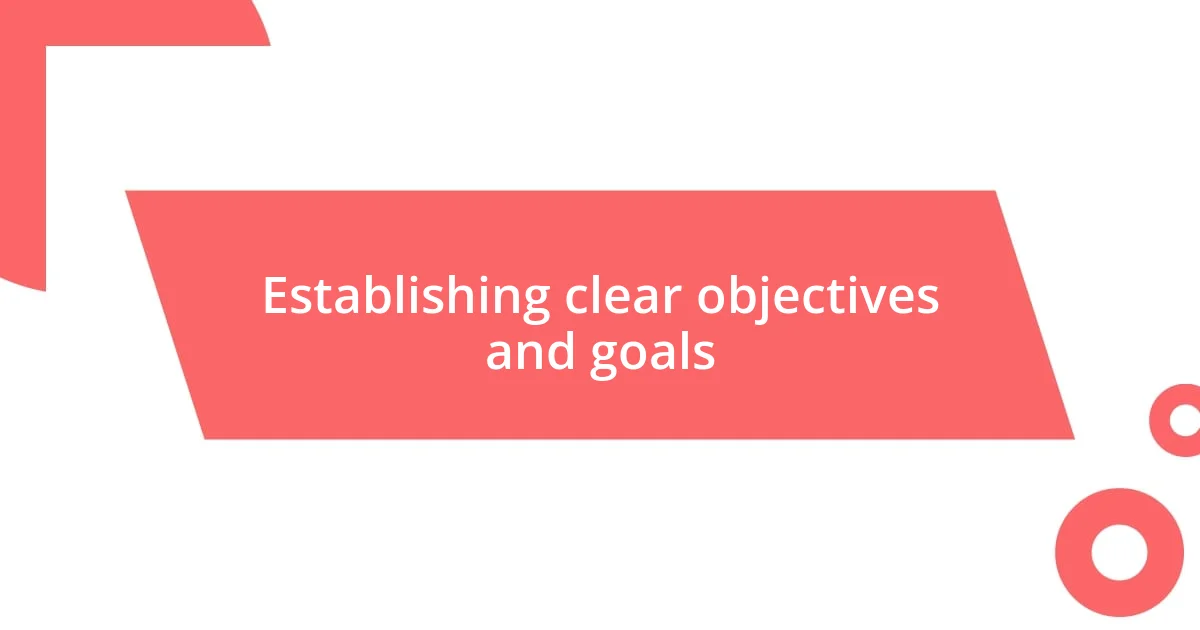
Establishing clear objectives and goals
Having clear objectives and goals is like setting a destination before embarking on a journey; without that clarity, you risk wandering aimlessly. I’ve learned that defining specific outcomes not only motivates mentors but also gives mentees a target to strive toward. For instance, when I initiated my first mentorship program, we collectively decided to focus on developing practical skills that directly aligned with the mentees’ career ambitions. This process not only excited them but also clarified what success looked like for each relationship.
I remember sitting down with my first mentee, who was unsure about his future. Together, we outlined his goals and identified key milestones, like mastering a specific software tool in three months. This approach helped him feel a sense of direction, and the progress we made was incredibly satisfying for both of us. Have you ever experienced that kind of focused clarity? It can transform uncertainty into actionable plans.
In my experience, it’s crucial to revisit these objectives regularly. By discussing how the mentorship is progressing and whether the initial goals still resonate, both parties can adapt and refine their intentions. Sharing those moments of reflection can be powerful; it allows you to celebrate small wins, like mastering a new skill or achieving a project milestone, while also recalibrating as necessary. This keeps the relationship vibrant and ensures that everyone feels invested in the journey.
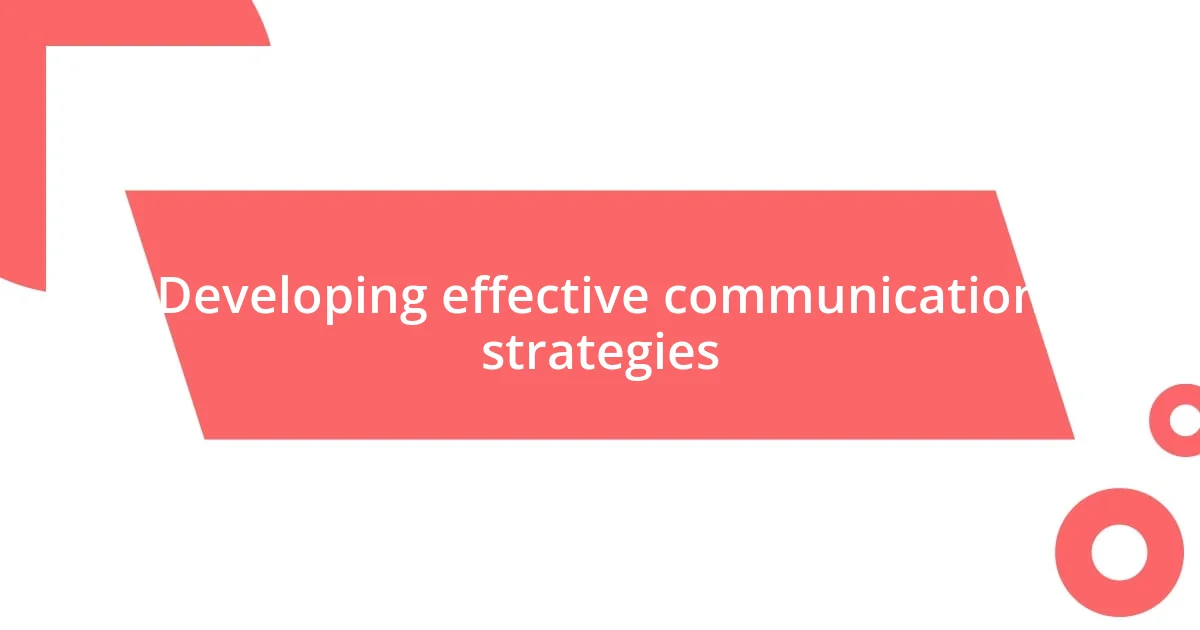
Developing effective communication strategies
Effective communication strategies are the backbone of a successful mentorship program. From my experience, fostering an open dialogue between mentors and mentees creates an atmosphere of trust. I recall a time when a mentee hesitated to share her struggles with balancing work and study. Once I encouraged her to voice her concerns, she spoke openly about her challenges, and we could brainstorm practical solutions together. Have you ever felt the weight lift after sharing your burdens with someone? It’s truly transformative.
I also believe in active listening as a key component of communication. Often, mentors may want to provide solutions immediately, but I’ve found that pausing to listen yields deeper insights. For example, in one of my early sessions, I noticed my mentee’s reluctance to discuss his career doubts. By simply asking open-ended questions and allowing silence for him to reflect, he eventually opened up about his fears. This not only deepened our connection but also led to more targeted guidance. Isn’t it remarkable how sometimes all it takes is a little patience?
Finally, utilizing varied communication tools can enhance the exchange between mentors and mentees. Whether it’s through emails, video calls, or even text messages, I’ve noticed that using a mix of mediums can keep the momentum going. In my program, I often set up quick check-ins via messaging apps for those moments when a mentee might have a question but isn’t ready for a full meeting. It’s these small, consistent interactions that build rapport over time. Have you found that certain modes of communication resonate more with your mentees? It’s worth experimenting to see what works best for everyone involved.
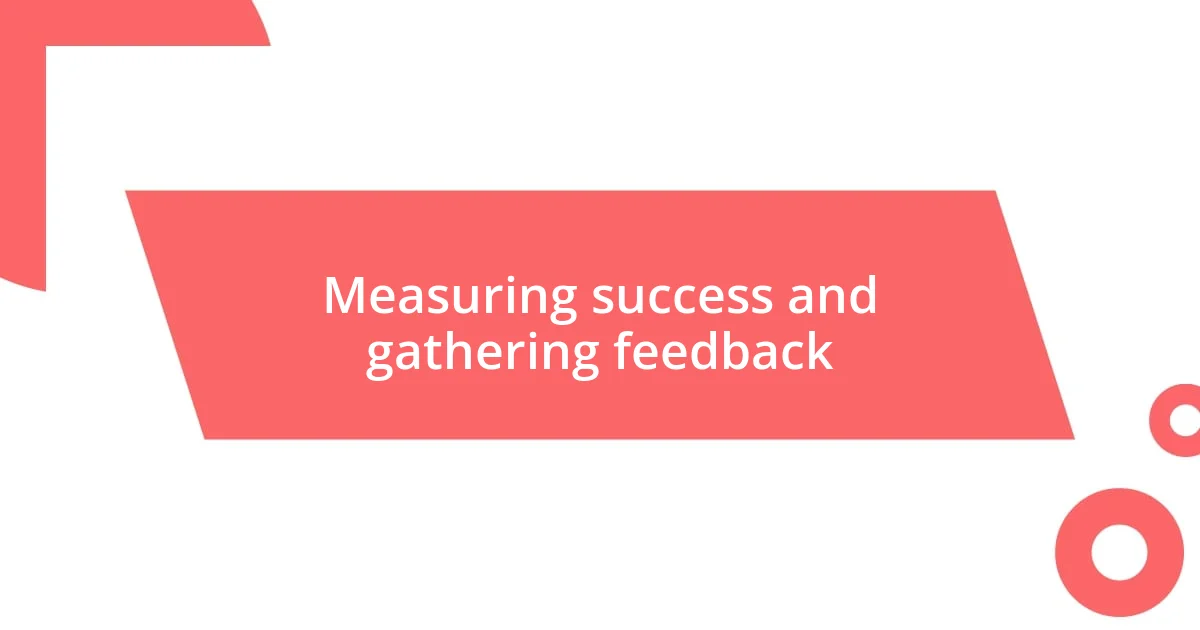
Measuring success and gathering feedback
To truly understand the effectiveness of a mentorship program, I’ve found that gathering feedback is non-negotiable. I typically create a simple survey at the end of each mentoring cycle, asking both mentors and mentees about their experiences. I remember one mentee’s unexpected response about feeling valued for simply being heard; this insight was a reminder of how powerful visibility can be. How often do we overlook the importance of just making someone feel seen?
Beyond surveys, informal check-ins can provide valuable context that quantitative data may miss. I often schedule casual coffee chats with mentors to discuss their insights on what worked or what didn’t. During one of these discussions, a mentor mentioned they felt uncertain about their contributions; this opened up a much-needed conversation about the unique strengths each mentor brings. Have you ever paused to consider the impact of your contributions from someone else’s perspective? It can be illuminating.
Lastly, I advocate for measuring success through both qualitative and quantitative metrics. For instance, I track skills acquired or goals achieved alongside emotional growth and self-reflection shared in mentoring sessions. One time, a mentee celebrated not just landing a job but also gaining confidence in networking, which was just as valuable. Isn’t it fascinating how success isn’t solely about achieving milestones but also about personal development? Balancing these perspectives helps create a richer narrative of success in a mentorship program.










